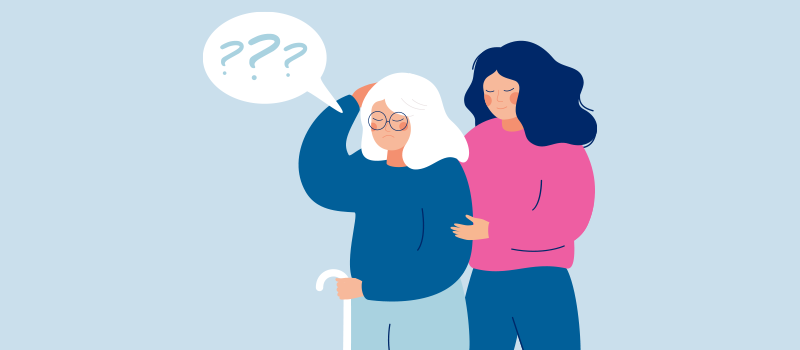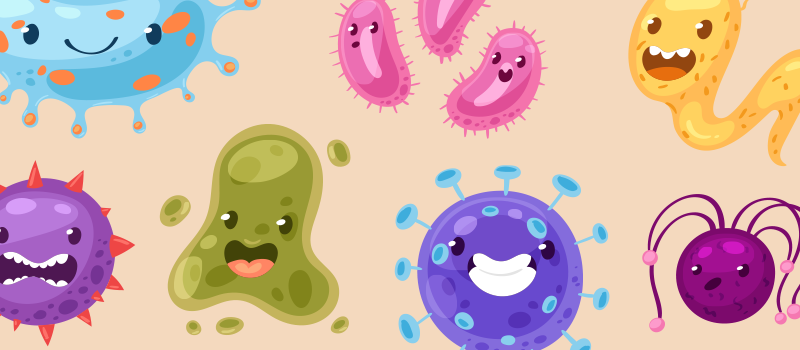What’s the Buzz
The Bee Healthy Blog
What are the Early Signs & Symptoms of Alzheimer's Disease?

Alzheimer’s disease is an irreversible, progressive brain disorder that slowly destroys memory and thinking skills and, eventually, the ability to carry out the most familiar tasks[1]. The number of Americans living with Alzheimer's disease is growing, with more than six million diagnosed. The Alzheimer's Association even projects that 12.7 million Americans will develop this condition by 2050. Sadly, there is no cure for Alzheimer's disease, however, there are several treatment methods available to help slow the progression. In light of Alzheimer's Awareness Month, here are crucial signs and symptoms to look out for.
What is Alzheimer's Disease?
The disease is named after Dr. Alois Alzheimer. In 1906, Dr. Alzheimer noticed changes in the brain tissue of a woman who had died of an unusual mental illness. Her symptoms included memory loss, language problems, and unpredictable behavior. After she died, he examined her brain and found many abnormal clumps (now called amyloid plaques) and tangled bundles of fibers (now called neurofibrillary, or tau, tangles)[2].
These plaques and tangles in the brain are still considered some of the main features of Alzheimer’s disease. Neurons transmit messages between different parts of the brain, and from the brain to muscles and organs in the body. Many other complex brain changes are thought to play a role in Alzheimer’s, too.
This damage initially appears to take place in the hippocampus, the part of the brain essential in forming memories. As neurons die, additional parts of the brain are affected. By the final stage of Alzheimer’s, the damage is widespread, and brain tissue has shrunk significantly[1].
For most people with the disease—those with the late-onset type—symptoms first appear in their mid-60s. Early-onset Alzheimer’s occurs between a person’s 30s and mid-60s and is very rare. Alzheimer’s disease is the most common cause of dementia among older adults (Dementia is a general term for loss of memory and other mental abilities severe enough to interfere with daily life. It is caused by physical changes in the brain. Alzheimer's is the most common type of dementia, but there are many kinds)[1].
Signs of Mild Alzheimer’s Disease
Signs of mild Alzheimer’s disease include:
- Memory loss
- Poor judgment leading to bad decisions
- Loss of spontaneity and sense of initiative
- Taking longer to complete normal daily tasks
- Repeating questions
- Trouble handling money and paying bills
- Wandering and getting lost
- Losing things or misplacing them in odd places
- Mood and personality changes
- Increased anxiety and/or aggression
Signs of Moderate Alzheimer’s Disease
In this stage, more intensive supervision and care become necessary and symptoms may include[1]:
- Increased memory loss and confusion
- Inability to learn new things
- Changes in mood (outbursts of anger)
- Difficulty with language and problems with reading, writing and working with numbers
- Difficulty organizing thoughts and thinking logically
- Shortened attention span
- Problems coping with new situations
- Difficulty carrying out multi-step tasks, such as getting dressed
- Problems recognizing family and friends
- Hallucinations, delusions, and paranoia
- Impulsive behavior such as undressing at inappropriate times or places or using vulgar language
- Restlessness, agitation, anxiety, tearfulness, wandering—especially in the late afternoon or evening
- Repetitive statements or movement, occasional muscle twitches
Signs of Severe Alzheimer’s Disease
People with severe Alzheimer’s cannot communicate and are completely dependent on others for their care. Near the end, the person may be in bed most or all of the time as the body shuts down. Their symptoms often include[1]:
- Inability to communicate
- Weight loss
- Seizures
- Skin infections
- Difficulty swallowing
- Groaning, moaning, or grunting
- Increased sleeping
- Loss of bowel and bladder control
A common cause of death for people with Alzheimer’s disease is aspiration pneumonia. This type of pneumonia develops when a person cannot swallow properly and takes food or liquids into the lungs instead of air.
Best Medications for Alzheimer’s
There is currently no cure for Alzheimer’s, though there are medicines that can treat the symptoms of the disease.
For cognitive symptoms (thinking and memory):
These medications may help lessen or stabilize symptoms for a limited time by affecting certain chemicals involved in carrying messages among and between the brain's nerve cells:
- Donepezil (Aricept®)
- Galantamine (Razadyne®)
- Rivastigmine (Exelon®)
- Memantine (Namenda®)
- Mematine + Donepezil (Namzaric®)
Non-cognitive symptoms (behavioral and psychological symptoms)
Alzheimer’s affects more than just memory and thinking. A person’s quality of life may be impacted by a variety of behavioral and psychological symptoms that accompany dementia, such as sleep disturbances, agitation, hallucinations, and delusions. At this time, the FDA has approved one drug to address insomnia in people living with dementia
- Orexin receptor antagonist (Belsomra®) - Possible side effects include, but are not limited to: risk of impaired alertness and motor coordination (including impaired driving), worsening of depression or suicidal thinking, complex sleep behaviors (such as sleep-walking and sleep-driving), sleep paralysis and compromised respiratory function.
Natural Remedies for Alzheimer's Disease
Some people with Alzheimer’s disease can find certain lifestyle changes to be helpful in managing symptoms. Some natural remedies may include:
- Acupuncture
- Aromatherapy with lemon, lavender, orange, and rosemary
- Bright light therapy
- Coconut oil
- Omega 3
- Coenzyme Q10
- Coral calcium
- Ginkgo biloba herbal supplement
Alzheimer’s disease can take a toll on one’s life, not only on the person diagnosed but on family members as well. According to the CDC, death rates for Alzheimer’s disease are increasing, unlike heart disease and cancer death rates, which are on the decline. If you’re diagnosed with Alzheimer’s disease it’s important to take care of yourself and work with your doctor to manage symptoms.
[1] https://www.nia.nih.gov/health/what-alzheimers-disease
[2] https://www.alz.org/alzheimers-dementia/facts-figures
[3] https://www.cdc.gov/aging/aginginfo/alzheimers.htm








SOCIAL